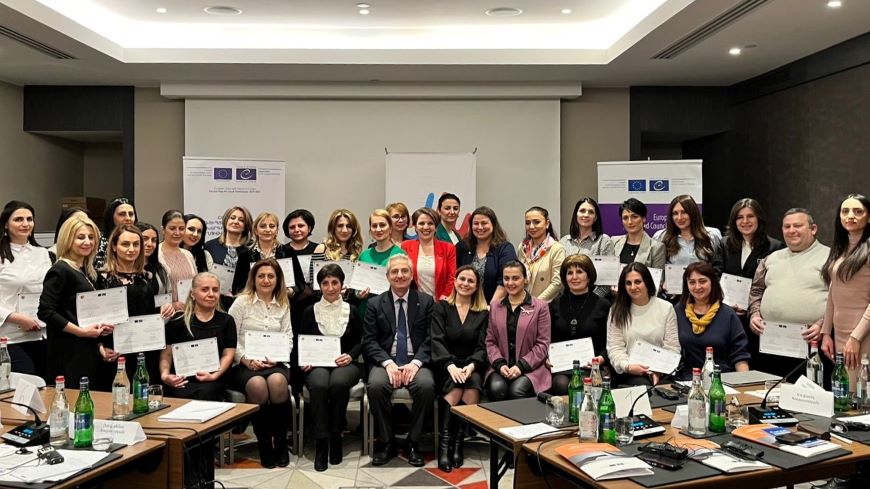Following the adoption of the Model Code of Conduct for Public Servants in Armenia in 2022, the Corruption Prevention Commission has moved on to actively promote its application by all public institutions of the country, with support from the Council of Europe.
The steps undertaken for the implementation of the Model Code include, among other, the elaboration of detailed interpretation guidelines, with a view to ensure a uniform understanding and application of the rules and their underlying principles at different levels of public service. In addition to the production of this written guidance, training is to be provided to Armenian public servants on the practical application of the Code in their respective daily work situations.
As part of this endeavour, a substantive training course on “Applying the Model Rules of Conduct for Public Servants in Armenia” was organised for 30 Integrity Officers, in charge of supporting the implementation of the Code and providing related guidance to their colleagues within Armenian public institutions. The four-day training programme was designed with a two-fold objective: on the one hand, to build the knowledge of the Integrity Officers on the principles and rules of conduct, as well as their capacity to interpret and apply them, and on the other hand, to train them as trainers for their peers on the same topics.
The methodology used for the training and training-of-trainers programmes was highly interactive, with combined contributions from international and national Council of Europe experts and practitioners, explaining the practical implications of the principles and rules of good conduct, discussing numerous examples of concrete situations where they apply, and stimulating reflection on current practices in the Armenian public service. Over the four days of the event, participants familiarised themselves with the definitions and norms of integrity and ethics in the public service, including the loyalty to public interest, respect, good faith, objectivity, transparency and accountability. They focused more deeply on some of the most important practical areas of corruption prevention, such as conflict of interest identification and management, prohibition and acceptance of gifts, use of public resources and information, or whistleblowing and reporting of corruption. Then, going beyond the core binding norms themselves, they also reflected on more aspirational aspects of public service ethics.
After learning the contents of the training programme, the Integrity Officers also received guidance and tips on how to provide such training themselves to others, and benefited from the opportunity to immediately put these skills in practice by conducting mock training sessions with the use of diverse training methods.
Following up, similar training will be provided to a second group of Integrity Officers, and a selected group of these trained trainers will then be further supported to sharpen their skills and deliver cascade training and awareness-raising sessions for employees of public bodies on the Model Rules of Conduct and their interpretation.
This activity helps fulfil the commitments of the Corruption Prevention Commission (CPC) on enhancing the capacities of Integrity Officers appointed in public authorities and institutions for the effective application of the rules and more systematic promotion of ethical practices at all levels of public service. It also supports the requirements for the organisation of anti-corruption courses and training programmess for officials and public servants by the CPC, as defined in the Law.
More generally, it builds national capacity to expand awareness and promote changes of mentalities and practice towards more effective prevention of corruption in the entire Armenian public service. This is also in line with European standards and recommendations of GRECO (the Group of States against Corruption) regarding the adoption, but also concrete actions for the implementation of Codes of Conduct.
Building on the achievements obtained through the cooperation between the Corruption Prevention Commission of Armenia and the PGG II-Armenia Project, the Council of Europe will continue to support the Armenian authorities in further enhancing the effectiveness of their national corruption prevention system.
These activities were conducted in the framework of the Project on “Strengthening institutional capacities to fight and prevent corruption in Armenia” which is co-funded by the European Union and the Council of Europe and implemented by the Council of Europe in their Partnership for Good Governance II.






